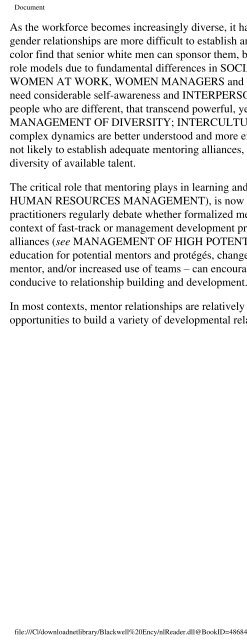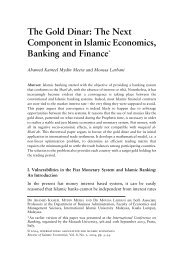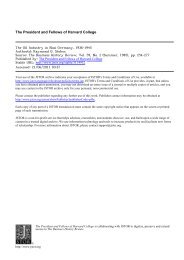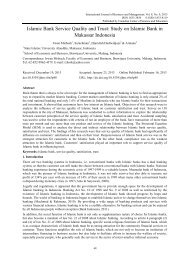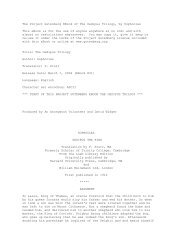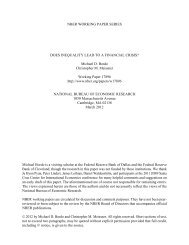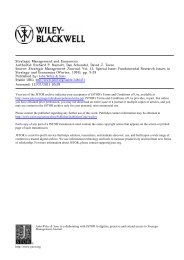- Page 2:
Document The Blackwell Encyclopedic
- Page 6:
Document The Blackwell Encyclopedic
- Page 10:
Document Typeset in 9.5 on 11pt Ehr
- Page 14:
Document Preface Organizational Beh
- Page 18:
Document Page vii all who have shar
- Page 22:
Document current and developing tre
- Page 26:
Document Page ix It is helpful, the
- Page 30:
Document Page x Clearly, to fulfil
- Page 34:
Document Acknowledgments Page xi Th
- Page 38:
Document Contributors Seymour Adler
- Page 42:
Document Adrienne Colella Rutgers U
- Page 46:
Document Daniel C. Feldman Universi
- Page 50:
Document Jerald Hage University of
- Page 54:
Document Kenneth Koput University o
- Page 58:
Document Stella M. Nkomo University
- Page 62:
Document John W. Slocum Southern Me
- Page 66:
Document Edward J. Zajac Northweste
- Page 70:
Document The term can be defined as
- Page 74:
Document The deviance model derives
- Page 78:
Document Goodman, P. S. & Atkin, R.
- Page 82:
Document Dwyer, T. & Raferty, A. E.
- Page 86:
Document Spangler, W. D. (1992). Va
- Page 90:
Document Fryer, D. & Fagan, R. (199
- Page 94:
Document Action Theory can well exp
- Page 98:
Document interdependencies among th
- Page 102:
Document Mood at work has been negl
- Page 106:
Document In all cases we need to as
- Page 110:
Document As part of the wider conce
- Page 114:
Document Support for ARM comes from
- Page 118:
Document See also Exchange relation
- Page 122:
Document Employee Assistance Progra
- Page 126:
Document NIGEL NICHOLSON Altruism T
- Page 130:
Document In ORGANIZATIONAL BEHAVIOR
- Page 134:
Document Some form of assessment ta
- Page 138:
Document Evidence on the criterion-
- Page 142:
Document Gaugler, B., Rosenthal, D.
- Page 146:
Document Attitudes are of interest
- Page 150:
Document Although there are many va
- Page 154:
Document The final assignment of re
- Page 158:
Document Weiner, B. (1986). An attr
- Page 162:
Document In his seminal study of au
- Page 166:
Document These are groups of employ
- Page 170:
Document Autonomy This concept, in
- Page 174:
Document B Bargaining see COLLECTIV
- Page 178:
Document 5. Product Differentiation
- Page 182:
Document See also Conditioning; Inf
- Page 186:
Document During the 1980s and 1990s
- Page 190:
Document Usually, companies benchma
- Page 194:
Document The procedure involves all
- Page 198:
Document Whereas bonus payments for
- Page 202:
Document Bibliography Burns, T. & S
- Page 206:
Document Used in conjunction with m
- Page 210:
Document Compared to modern busines
- Page 214:
Document Bureaucracies are known fo
- Page 218:
Document Economists have asked pers
- Page 222:
Document Simon, H. A. (1976). Admin
- Page 226:
Document The key differences betwee
- Page 230:
Document Still others have focused
- Page 234:
Document Also called ''business pro
- Page 238:
Document C Career Page 44 A career
- Page 242:
Document anchor provides a growing
- Page 246:
Document Page 46 of schemes in term
- Page 250:
Document Holland, J. H. (1985). Mak
- Page 254:
Document Situational Theories Page
- Page 258:
Document Career Plateauing Page 49
- Page 262:
Document Lawrence, B. S. (1988). Ne
- Page 266:
Document reciprocal interaction of
- Page 270:
Document Page 52 The history of car
- Page 274:
Document Howard, A. & Bray, D. W. (
- Page 278:
Document 3 The Management of the Ch
- Page 282:
Document used, which seeks to reduc
- Page 286:
Document See also Generalization; L
- Page 290:
Document organization; and for CEOs
- Page 294:
Document Romanelli, E. & Tushman, M
- Page 298:
Document See also Organizational ef
- Page 302:
Document Focus of Change Efforts Pa
- Page 306:
Document Bibliography Page 61 Argyr
- Page 310:
Document Page 62 observations would
- Page 314:
Document file:///C|/downloadnetlibr
- Page 318:
Document Early results found that t
- Page 322:
Document The most frequently stated
- Page 326:
Document See also Strategic managem
- Page 330:
Document This term refers to the in
- Page 334:
Document Current research in cognit
- Page 338:
Document The theory seeks to accoun
- Page 342:
Document Strategic collaboration wi
- Page 346:
Document The first formal definitio
- Page 350:
Document When there is CONFLICT bet
- Page 354:
Document Webb (1897) coined the ter
- Page 358:
Document Viewed in this longer pers
- Page 362:
Document In their influential work
- Page 366:
Document Bibliography Becker, H. (1
- Page 370:
Document Escalation is the degree t
- Page 374:
Document A major controversy concer
- Page 378:
Document Two functions of communica
- Page 382:
Document variety of language, and p
- Page 386:
Document Communications Technology
- Page 390:
Document New communication technolo
- Page 394:
Document In ecological theories, or
- Page 398:
Document Competencies The word "com
- Page 402:
Document A significant trend is for
- Page 406:
Document Job analysis shows that se
- Page 410:
Document Bibliography Boyatzis, R.
- Page 414:
Document Companies might also diffe
- Page 418:
Document The concept of complexity
- Page 422:
Document Lawrence, P. & Lorsch, J.
- Page 426:
Document CAD systems allow the user
- Page 430:
Document The first methodology for
- Page 434:
Document (a) specification of the b
- Page 438:
Document Is conflict a problem? Muc
- Page 442:
Document Struggles over the allocat
- Page 446:
Document Bibliography Alderfer, C.
- Page 450:
Document Other strategies restructu
- Page 454:
Document There are three fundamenta
- Page 458:
Document (b) the individual's attit
- Page 462:
Document see INTERPERSONAL SKILLS;
- Page 466:
Document Consensus refers to an inf
- Page 470:
Document A typical consulting proce
- Page 474:
Document Future Trends A review of
- Page 478:
Document These dimensions are combi
- Page 482:
Document 5. The extent to which the
- Page 486:
Document Contingency theory was und
- Page 490:
Document Imai, M. (1987). Kaizen: T
- Page 494:
Document Obviously, good INTERPERSO
- Page 498:
Document Williamson (1985), one of
- Page 502:
Document A last type of contract re
- Page 506:
Document Within ORGANIZATIONAL BEHA
- Page 510:
Document Ashford, S. J. & Cummings,
- Page 514:
Document Nonetheless, various obsta
- Page 518:
Document The concept of core compet
- Page 522:
Document The principle of public re
- Page 526:
Document There are a range of possi
- Page 530:
Document Organizational researchers
- Page 534:
Document (c) understanding complexi
- Page 538:
Document The terms crisis and disas
- Page 542:
Document In contrast, Osborn and Ja
- Page 546:
Document WASH-1400, a.k.a., the Ras
- Page 550:
Document Culture is a notoriously d
- Page 554:
Document The literature contains mu
- Page 558:
Document • There should not be mo
- Page 562:
Document relationships to their gro
- Page 566:
Document (b) whether and how the cu
- Page 570:
Document D Decentralization Page 12
- Page 574:
Document sometimes called mixed MEC
- Page 578:
Document Depending on: (1) various
- Page 582:
Document Table 1 The four decision-
- Page 586:
Document Decision making in the are
- Page 590:
Document A similar line of thought
- Page 594:
Document Decision Modeling see COMP
- Page 598:
Document HENRY P. SIMS JR. Delphi T
- Page 602:
Document One alternative is a legal
- Page 606:
Document Closely related to the pro
- Page 610:
Document See also Organizational de
- Page 614:
Document The analysis of dilemmas h
- Page 618:
Document Research concerning person
- Page 622:
Document Goffman, E. (1963). Stigma
- Page 626:
Document Theories of discrimination
- Page 630:
Document Katz, P. & Taylor, D. (198
- Page 634:
Document Another form of related di
- Page 638:
Document More relevant is a micro d
- Page 642:
Document However, in more fragmente
- Page 646:
Document For example, the director-
- Page 650:
Document Second, downsizing usually
- Page 654:
Document Most research to date indi
- Page 658:
Document E Ecology see COMMUNITY EC
- Page 662:
Document extraversion and neurotici
- Page 666:
Document Page 152 Importantly, emot
- Page 670:
Document Bibliography Fineman, S. (
- Page 674:
Document Bibliography Cotton, J. L.
- Page 678:
Document Page 155 Greenberg, J. (19
- Page 682:
Document our understanding of the b
- Page 686:
Document Page 157 for if you wait t
- Page 690:
Document Page 158 these actually pr
- Page 694:
Document Page 159 mixed to date, bu
- Page 698:
Document Page 160 large financial d
- Page 702:
Document When one's own outcome/inp
- Page 706:
Document Page 162 research discipli
- Page 710:
Document Page 163 oping countries i
- Page 714:
Document Page 164 error of the seco
- Page 718:
Document Figure 1 A taxonomy of act
- Page 722:
Document Ethics see BUSINESS ETHICS
- Page 726:
Document van den Berghe, P. (1981).
- Page 730:
Document Evaluation Research Page 1
- Page 734:
Document • the call for ethical c
- Page 738:
Document Page 170 Fombrun, C., Tich
- Page 742:
Document Page 171 utilizing Bartlet
- Page 746:
Document devote more resources to d
- Page 750:
Document Expectancy see VIE THEORY;
- Page 754:
Document F Family Firms Page 174 Al
- Page 758:
Document management systems. Journa
- Page 762:
Document Figure 1 The feedback loop
- Page 766:
Document Use Page 177 Feedback info
- Page 770:
Document attend to and how they wou
- Page 774:
Document high, both suppliers and b
- Page 778:
Document Page 180 positive attribut
- Page 782:
Document Figure 1 Force field diagr
- Page 786:
Document Formal Organization Page 1
- Page 790:
Document According to Schein (1985)
- Page 794:
Document Functional Design Page 184
- Page 798:
Document the most salient aspect of
- Page 802:
Document G Gainsharing Page 186 Thi
- Page 806:
Document Page 187 greater attention
- Page 810:
Document Page 188 receives the amou
- Page 814:
Document Page 189 Von Neumann, J. &
- Page 818:
Document Page 190 who either help t
- Page 822:
Document Page 191 maintained. This
- Page 826:
Document Page 192 joking as intimid
- Page 830:
Document Goal Setting Page 193 This
- Page 834:
Document Page 194 cognition which p
- Page 838:
Document Page 195 The basic questio
- Page 842:
Document Government Agencies Page 1
- Page 846:
Document Figure 1 The main function
- Page 850:
Document Gujarah, D. (1984). Govern
- Page 854:
Document Organizational groups can
- Page 858:
Document 9 The SOCIAL LOAFING effec
- Page 862:
Document Janis, I. L. (1982). Group
- Page 866:
Document Longitudinal studies of WO
- Page 870:
Document Lewin, who once said, "not
- Page 874:
Document Most norms develop gradual
- Page 878:
Document Within the study of GROUP
- Page 882:
Document The relationship between g
- Page 886:
Document Groupthink This term was c
- Page 890:
Document This refers to the strengt
- Page 894:
Document H Halo Effect Page 210 Thi
- Page 898:
Document Page 211 RELIABILITY, VALI
- Page 902:
Document Bibliography Page 212 Roet
- Page 906:
Document 1993; Sackett, Burris, & C
- Page 910:
Document Page 214 seasonal variatio
- Page 914:
Document Page 215 strain) while in
- Page 918:
Document Page 216 promote low, as w
- Page 922:
Document Page 217 A third approach,
- Page 926:
Document Page 218 introduce the bes
- Page 930:
Document Page 219 To understand the
- Page 934:
Document Page 220 influence effecti
- Page 938:
Document Page 221 highly political
- Page 942:
Document Herriot (Eds), Handbook of
- Page 946:
Document Eysenck, H. J. (1960). The
- Page 950:
Document From this perspective an o
- Page 954:
Document Impression management has
- Page 958:
Document (3) Does impression manage
- Page 962:
Document Differences associated wit
- Page 966:
Document The trait approach describ
- Page 970:
Document As Kochan notes (1980, pp.
- Page 974:
Document See also Intergroup relati
- Page 978:
Document Influence also may result
- Page 982:
Document The particular mix of the
- Page 986:
Document Orlikowski, W. J. (1992).
- Page 990:
Document Amabile (1983), Angle (198
- Page 994:
Document The development of this in
- Page 998:
Document The developmental pattern
- Page 1002:
Document The adoption of new ideas
- Page 1006:
Document Innovations originate "som
- Page 1010:
Document JOHANNES M. PENNINGS Insti
- Page 1014:
Document How do organizational prac
- Page 1018:
Document The concept of isomorphism
- Page 1022:
Document Scott, W. R. & Meyer, J. W
- Page 1026:
Document See also Performance, indi
- Page 1030:
Document Intelligence is a broad ba
- Page 1034:
Document Endler, N. S. & Magnusson,
- Page 1038:
Document Interest Groups see POLITI
- Page 1042:
Document between groups. Several ap
- Page 1046:
Document Tajfel, H. (1982). Social
- Page 1050:
Document As most of the industriali
- Page 1054:
Document See also International man
- Page 1058:
Document On the one hand the "conve
- Page 1062:
Document On the other hand, the "cu
- Page 1066:
Document International managers wor
- Page 1070:
Document This is a general term whi
- Page 1074:
Document The third stream of IOR re
- Page 1078:
Document DAVID A. WHETTEN and MARC
- Page 1082:
Document Skills and competencies ar
- Page 1086:
Document 1. Response inspecificity.
- Page 1090:
Document These approaches are not e
- Page 1094:
Document Intrinsic REWARDS are foun
- Page 1098:
Document Introversion see EXTRAVERS
- Page 1102:
Document Quantitative methods allow
- Page 1106:
Document Landy, F. (1993). Job anal
- Page 1110:
Document Fried, Y. & Ferris, G. R.
- Page 1114:
Document In principle, the concept
- Page 1118:
Document Current approaches to job
- Page 1122:
Document Interest in job design whi
- Page 1126:
Document Lawler, E. E. (1992). The
- Page 1130:
Document Certainly taken over a lon
- Page 1134:
Document Establishing Client Relati
- Page 1138:
Document The population of insecure
- Page 1142:
Document This refers to systematica
- Page 1146:
Document Many factors have been hyp
- Page 1150:
Document This refers to the entry a
- Page 1154:
Document Typically, the equity posi
- Page 1158:
Document In JIT, inventory is waste
- Page 1162:
Document See also Advanced manufact
- Page 1166:
Document In attempting to determine
- Page 1170:
Document See also Business ethics;
- Page 1174:
Document A characteristic feature o
- Page 1178:
Document L Labor Markets Page 282 F
- Page 1182:
Document Page 283 theory. Arguably,
- Page 1186:
Document Page 284 He was able to sh
- Page 1190:
Document Leadership is " . . . a pr
- Page 1194:
Document Page 286 COMPLIANCE from s
- Page 1198:
Document above, emphasizing ideolog
- Page 1202:
Document Bass, B. M. (1990). Bass &
- Page 1206:
Document Page 289 leader self-prese
- Page 1210:
Document Page 290 objectives, funct
- Page 1214:
Document higher levels of MOTIVATIO
- Page 1218:
Document Page 292 which experiences
- Page 1222:
Document development (see SELF-REGU
- Page 1226:
Document Page 294 age or experience
- Page 1230:
Document Page 295 we might expect t
- Page 1234:
Document Page 296 Another cross-lev
- Page 1238:
Document Page 297 relatively new. B
- Page 1242:
Document Page 298 and more on later
- Page 1246:
Document Spector, P. E. (1988). Dev
- Page 1250:
Document M Machiavellianism Page 30
- Page 1254:
Document Page 301 provided with pro
- Page 1258:
Document Page 302 H. L. Gantt, whos
- Page 1262:
Document (6) provide FEEDBACK at re
- Page 1266:
Document opportunity to make and im
- Page 1270:
Document Dechant, K. (1990). Knowin
- Page 1274:
Document inception of action learni
- Page 1278:
Document Bibliography Burke, W. W.
- Page 1282:
Document Table 1 Taxonomy of Primar
- Page 1286:
Document edge-based diversity. Team
- Page 1290: Document Page 311 most concern to t
- Page 1294: Document Page 312 what is learned i
- Page 1298: Document the development of talente
- Page 1302: Document life-time career. The dema
- Page 1306: Document studies of actual behavior
- Page 1310: Document Page 316 some of this vari
- Page 1314: Document Page 317 9, 9 Team Managem
- Page 1318: Document Page 318 job loss (see RED
- Page 1322: Document Matrix Organization Page 3
- Page 1326: Document Page 320 aerospace, invest
- Page 1330: Document structure but as a frame-o
- Page 1334: Document on mental health makes the
- Page 1338: Document Page 323 French, J. R. P.,
- Page 1344: Document An acquisition is the lega
- Page 1348: Document Human resource researchers
- Page 1352: Document impersonal, functional, an
- Page 1356: Document Minority group INFLUENCE i
- Page 1360: Document Mission statements serve s
- Page 1364: Document (1) Moral reasoning increa
- Page 1368: Document In the organizational beha
- Page 1372: Document Numerous theories of work
- Page 1376: Document Personality-based views of
- Page 1380: Document The popularity of these ap
- Page 1384: Document than an overall job perfor
- Page 1388: Document For these reasons, further
- Page 1392:
Document Locke, E. A., Shaw, K. N.,
- Page 1396:
Document Page 337 this threshold ma
- Page 1400:
Document Page 338 in training, but
- Page 1404:
Document Page 339 ments (Farr, 1977
- Page 1408:
Document Page 340 Its strength is l
- Page 1412:
Document Bibliography Bartlett, C.
- Page 1416:
Document N Natural Selection see PO
- Page 1420:
Document Individual Differences Pag
- Page 1424:
Document MACY, or expertise are les
- Page 1428:
Document for mutually beneficial tr
- Page 1432:
Document Page 346 models is clique
- Page 1436:
Document the information content, m
- Page 1440:
Document Bibliography Burt, R. S. (
- Page 1444:
Document Nonprofit Organizations se
- Page 1448:
Document life and nonwork responsib
- Page 1452:
Document (2) Government and its age
- Page 1456:
Document O Obedience Page 352 In th
- Page 1460:
Document Page 353 of LABOR MARKET i
- Page 1464:
Document Page 354 labor market. In
- Page 1468:
Document the variety of disturbance
- Page 1472:
Document Page 356 prescribe best pr
- Page 1476:
Document Page 357 exchanges and the
- Page 1480:
Document help firms to perform more
- Page 1484:
Document Page 359 provide more reso
- Page 1488:
Document particularly through a mor
- Page 1492:
Document Page 361 the United Kingdo
- Page 1496:
Document Page 362 ization, not indi
- Page 1500:
Document Page 363 At about the same
- Page 1504:
Document Page 364 sociology, politi
- Page 1508:
Document Page 365 ment" and "corpor
- Page 1512:
Document North America than in Euro
- Page 1516:
Document Page 367 organizational ch
- Page 1520:
Document Page 368 Typically, observ
- Page 1524:
Document Each stage of development
- Page 1528:
Document Page 370 knowledge, time,
- Page 1532:
Document Page 371 occur between opp
- Page 1536:
Document Page 372 new situations (i
- Page 1540:
Document Page 373 change are explan
- Page 1544:
Document (d) discretionary social w
- Page 1548:
Document Page 375 This has recently
- Page 1552:
Document for-granted aspects of cul
- Page 1556:
Document Page 377 their own persona
- Page 1560:
Document Page 378 has gained wide a
- Page 1564:
Document differences, in part due t
- Page 1568:
Document Page 380 as the defining f
- Page 1572:
Document view). Finally, some probl
- Page 1576:
Document Bibliography Page 382 Alve
- Page 1580:
Document Page 383 continues operati
- Page 1584:
Document Page 384 workforces, due t
- Page 1588:
Document Page 385 Under the heading
- Page 1592:
Document son and illustrate the und
- Page 1596:
Document precisely programmed into
- Page 1600:
Document Page 388 also occur by mea
- Page 1604:
Document by adopting structures whi
- Page 1608:
Document Page 390 systems are arche
- Page 1612:
Document Page 391 applied by schola
- Page 1616:
Document Page 392 effective may not
- Page 1620:
Document Page 393 universalistic de
- Page 1624:
Document Page 394 defects in goods-
- Page 1628:
Document See also Organization theo
- Page 1632:
Document Page 396 routines. Organiz
- Page 1636:
Document Table 1 The characteristic
- Page 1640:
Document strategic and structural d
- Page 1644:
Document Page 400 Where size is not
- Page 1648:
Document Kuhn, T. (1970). The struc
- Page 1652:
Document Participation In an OB con
- Page 1656:
Document factor. Certainly, tests o
- Page 1660:
Document Wall, T. D., Kemp, N. J.,
- Page 1664:
Document House, R. J. (1977). A 197
- Page 1668:
Document Fourth, payment systems di
- Page 1672:
Document Fourth, in a global market
- Page 1676:
Document Much of the research on co
- Page 1680:
Document Several topics are commonl
- Page 1684:
Document Finally, to evaluate perfo
- Page 1688:
Document Campbell, J. P., McCloy, R
- Page 1692:
Document The core elements of all b
- Page 1696:
Document Appraisals vary in the way
- Page 1700:
Document Definitions of what perfor
- Page 1704:
Document Pay for performance is a t
- Page 1708:
Document Page 417 depend on so many
- Page 1712:
Document remains largely unexamined
- Page 1716:
Document general level, organizatio
- Page 1720:
Document Page 420 Weiss and Adler (
- Page 1724:
Document Page 421 existing personal
- Page 1728:
Document Page 422 land's Leadership
- Page 1732:
Document ANALYSIS to identify tasks
- Page 1736:
Document Attempts to enhance the pr
- Page 1740:
Document Page 425 level criteria. I
- Page 1744:
Document Personality Testing Page 4
- Page 1748:
Document Page 427 inappropriately,
- Page 1752:
Document blurring of boundaries, an
- Page 1756:
Document and compromise, reflecting
- Page 1760:
Document Page 430 stakes in the dec
- Page 1764:
Document Page 431 effectiveness or
- Page 1768:
Document Page 432 Hickson, D. et al
- Page 1772:
Document niches available to specia
- Page 1776:
Document Page 434 nathan (1992), wh
- Page 1780:
Document Page 435 more, even when o
- Page 1784:
Document McPherson, J. M. (1983). A
- Page 1788:
Document Page 437 ing rates of chan
- Page 1792:
Document common purposes being soug
- Page 1796:
Document Harassment, sexual or othe
- Page 1800:
Document Campbell (Eds), Productivi
- Page 1804:
Document file:///C|/downloadnetlibr
- Page 1808:
Document EDWIN P. HOLLANDER Power D
- Page 1812:
Document This can be defined as a n
- Page 1816:
Document This is a strategic intera
- Page 1820:
Document The importance of the "bel
- Page 1824:
Document Boardman, A. & Vining, A.
- Page 1828:
Document Process consulting depends
- Page 1832:
Document Mohr (1982) drew a distinc
- Page 1836:
Document When all the input and out
- Page 1840:
Document Kendrick, J. W. (1984). Im
- Page 1844:
Document From the professional's po
- Page 1848:
Document Armstrong, P. (1993). Prof
- Page 1852:
Document The agenda for project adm
- Page 1856:
Document For example, the director
- Page 1860:
Document See also Organizational ec
- Page 1864:
Document Why is the concept of curr
- Page 1868:
Document Greenberg, J. (1990). Orga
- Page 1872:
Document A person's score on a test
- Page 1876:
Document (1) attention from others;
- Page 1880:
Document Sport provides an illustra
- Page 1884:
Document Finally, the contrasts bet
- Page 1888:
Document Punishment and discipline
- Page 1892:
Document Q Quality see TOTAL QUALIT
- Page 1896:
Document Page 464 For example, some
- Page 1900:
Document Page 465 tic and sometimes
- Page 1904:
Document Page 466 of persons come t
- Page 1908:
Document R Race Page 467 Prior to t
- Page 1912:
Document See also Equal opportuniti
- Page 1916:
Document Page 469 the most importan
- Page 1920:
Document Reciprocity Page 470 This
- Page 1924:
Document Page 471 PAYMENT SYSTEMS a
- Page 1928:
Document and argue for a broader ra
- Page 1932:
Document file:///C|/downloadnetlibr
- Page 1936:
Document Applications of operant CO
- Page 1940:
Document Bibliography Capaldi, E. J
- Page 1944:
Document This term refers to the re
- Page 1948:
Document Weigelt and Camerer (1988,
- Page 1952:
Document Although most strategists
- Page 1956:
Document Chakravarthy, B. (1986). M
- Page 1960:
Document STRATEGIC ALLIANCES involv
- Page 1964:
Document 2. Measurement. Measuremen
- Page 1968:
Document Schaubroeck and Kuehn (199
- Page 1972:
Document Schaubroeck, J. & Kuehn, K
- Page 1976:
Document Bibliography Easterby-Smit
- Page 1980:
Document At the macro level, this s
- Page 1984:
Document The concept of resources,
- Page 1988:
Document Because the environment pr
- Page 1992:
Document This is the deliberate mod
- Page 1996:
Document (2) framebreaking change w
- Page 2000:
Document Bibliography Freeman, S. J
- Page 2004:
Document Second, Hanisch (1994) exa
- Page 2008:
Document Finally, studies of job ch
- Page 2012:
Document Schwab, D. P., Rynes, S. L
- Page 2016:
Document Social psychological resea
- Page 2020:
Document (1986) describe the conten
- Page 2024:
Document Kunda, G. (1992). Engineer
- Page 2028:
Document Role conflict is one of se
- Page 2032:
Document Several current organizati
- Page 2036:
Document Bibliography Kahn, R., Wol
- Page 2040:
Document Both overload and underloa
- Page 2044:
Document This term specifies the co
- Page 2048:
Document S Sabotage Page 502 This m
- Page 2052:
Document Page 503 Forms of sabotage
- Page 2056:
Document Page 504 both in the Unite
- Page 2060:
Document criteria, and is therefore
- Page 2064:
Document production and prescribe w
- Page 2068:
Document Page 507 The single issue
- Page 2072:
Document Page 508 performance such
- Page 2076:
Document psychological test of nume
- Page 2080:
Document bined to form a battery of
- Page 2084:
Document Organizational Behavior an
- Page 2088:
Document personal processes (see SE
- Page 2092:
Document Page 513 R. O. Perloff (Ed
- Page 2096:
Document Page 514 tendencies while
- Page 2100:
Document Page 515 tive, and financi
- Page 2104:
Document Page 516 and men tend to h
- Page 2108:
Document woman" standard by some co
- Page 2112:
Document Page 518 to test the sensi
- Page 2116:
Document See also Organizational ef
- Page 2120:
Document Page 520 There have been m
- Page 2124:
Document Page 521 existing critique
- Page 2128:
Document Bibliography Zajonc, R. B.
- Page 2132:
Document differences among Chinese
- Page 2136:
Document Page 524 both the newcomer
- Page 2140:
Document Louis, M. R. (1980). Surpr
- Page 2144:
Document there should be a degree o
- Page 2148:
Document Page 527 Mumford, E. (1987
- Page 2152:
Document 1992) is empirical: An ite
- Page 2156:
Document Bibliography Urwick, L. F.
- Page 2160:
Document organizational behavior. E
- Page 2164:
Document analyses, have been used t
- Page 2168:
Document Page 532 case, status can
- Page 2172:
Document Page 533 overgeneralizatio
- Page 2176:
Document Page 534 JOINT VENTURES).
- Page 2180:
Document Mowery, D. (Ed.), (1988).
- Page 2184:
Document Page 536 relies on multipl
- Page 2188:
Document Cognitive Approaches Page
- Page 2192:
Document Page 538 have, in recent y
- Page 2196:
Document Page 539 concerned with ne
- Page 2200:
Document Page 540 Alarm (in prepara
- Page 2204:
Document Page 541 Ferguson, is the
- Page 2208:
Document Bibliography Page 542 Char
- Page 2212:
Document Page 543 Performance, in t
- Page 2216:
Document Page 544 this level of ana
- Page 2220:
Document Page 545 Succession planni
- Page 2224:
Document (1) the Strong man who dep
- Page 2228:
Document Page 547 dramatically. As
- Page 2232:
Document Page 548 team leader. Desp
- Page 2236:
Document Page 549 Given the widespr
- Page 2240:
Document and applications (pp. 3-28
- Page 2244:
Document Page 551 importance also.
- Page 2248:
Document Page 552 IZATIONAL BEHAVIO
- Page 2252:
Document Page 553 defines a key rol
- Page 2256:
Document T Taboos Page 554 Organiza
- Page 2260:
Document Page 555 See also Group dy
- Page 2264:
Document Page 556 While it was reco
- Page 2268:
Document Team Roles see GROUP ROLES
- Page 2272:
Document Page 558 variety of cuttin
- Page 2276:
Document Technology and Organizatio
- Page 2280:
Document is also significantly affe
- Page 2284:
Document Page 561 boundaries, for e
- Page 2288:
Document Page 562 disciplinary team
- Page 2292:
Document Williams, R. & Gibson, D.
- Page 2296:
Document Page 564 discourse whose p
- Page 2300:
Document Page 565 By way of conclus
- Page 2304:
Document Page 566 all circumstances
- Page 2308:
Document Page 567 organizational re
- Page 2312:
Document well as the characteristic
- Page 2316:
Document Page 569 involvement of se
- Page 2320:
Document Page 570 tices aimed at se
- Page 2324:
Document Page 571 One implication,
- Page 2328:
Document Page 572 are essentially s
- Page 2332:
Document Page 573 substantial prese
- Page 2338:
Document z0592-01.gif Figure 1 An i
- Page 2342:
Document Page 575 organizational sy
- Page 2346:
Document Page 576 system to interac
- Page 2350:
Document programs meeting important
- Page 2354:
Document is clear that the same ins
- Page 2358:
Document Page 579 systems will take
- Page 2362:
Document Page 580 are often highly
- Page 2366:
Document through behavioral modelin
- Page 2370:
Document tance to Williamson's (198
- Page 2374:
Document leadership, after refineme
- Page 2378:
Document Transitions see CAREER TRA
- Page 2382:
Document Page 585 economic actors i
- Page 2386:
Document Barber, B. (1983). The log
- Page 2390:
Document around agents tend to have
- Page 2394:
Document Page 588 MANAGERIAL STYLE)
- Page 2398:
Document Page 589 Mowday, Porter, &
- Page 2402:
Document Page 590 directed at multi
- Page 2406:
Document Page 591 Individuals exhib
- Page 2410:
Document U Uncertainty Page 592 Thi
- Page 2414:
Document Page 593 Hofstede, G. (198
- Page 2418:
Document ment, JOB INSECURITY, and
- Page 2422:
Document Page 595 CESSING). Several
- Page 2426:
Document The validity of data is re
- Page 2430:
Document (5) If necessary or desire
- Page 2434:
Document Because values are learned
- Page 2438:
Document England, G. W. (1967). Org
- Page 2442:
Document These cycles (or circles)
- Page 2446:
Document Example: In an employment
- Page 2450:
Document Historically, the emphasis
- Page 2454:
Document W Withdrawal, Organization
- Page 2458:
Document Page 605 omics, anthropolo
- Page 2462:
Document Page 606 exploring each to
- Page 2466:
Document Reskin, B. & Roos, P. A. (
- Page 2470:
Document Bibliography Brenner, O. C
- Page 2474:
Document Reimann, B. (1980). Organi
- Page 2478:
Document See also Group dynamics; G
- Page 2482:
Document Page 611 conditions for di
- Page 2486:
Document Index Note: Headwords are
- Page 2490:
Document advanced manufacturing tec
- Page 2494:
Document anthropology, 121 anticipa
- Page 2498:
Document and postmodernism, 436 pow
- Page 2502:
Document research design, 480 selec
- Page 2506:
Document typologies, 48 vocational
- Page 2510:
Document civil rights, 141, 241 cla
- Page 2514:
Document collective action, 71, 112
- Page 2518:
Document community ecology, 82 comm
- Page 2522:
Document and reciprocity, 470 sabot
- Page 2526:
Document and ownership, 13 research
- Page 2530:
Document obedience, 352 teleologica
- Page 2534:
Document business ethics, 41 career
- Page 2538:
Document power, 441 resources, 486
- Page 2542:
Document division of labor, 137, 14
- Page 2546:
Document managerial, 316 organizati
- Page 2550:
Document matrix organization, 319 o
- Page 2554:
Document evolutionary theory, organ
- Page 2558:
Document performance appraisal, 413
- Page 2562:
Document Follett, M. P., 63 force f
- Page 2566:
Document roles, 516 sexual harassme
- Page 2570:
Document groupthink, 207 quality ci
- Page 2574:
Document gate keepers, 189 group de
- Page 2578:
Document conflicts, 95 and discrimi
- Page 2582:
Document influence, 231 group dynam
- Page 2586:
Document empirical results, 241 gua
- Page 2590:
Document importance, 257 training,
- Page 2594:
Document job satisfaction, 2, 9, 75
- Page 2598:
Document knowledge of results, 280,
- Page 2602:
Document social constructionism, 52
- Page 2606:
Document management development, 30
- Page 2610:
Document management of high potenti
- Page 2614:
Document and analysis levels, 294 r
- Page 2618:
Document human relations movement,
- Page 2622:
Document innovation, 239 interorgan
- Page 2626:
Document team building, 555 organiz
- Page 2630:
Document demography, 383 differenti
- Page 2634:
Document organizational neurosis, 3
- Page 2638:
Document performance appraisal, 413
- Page 2642:
Document research, 481 performance,
- Page 2646:
Document phenomenology, 228 plannin
- Page 2650:
Document power, 5, 24, 437 autonomy
- Page 2654:
Document process technology, 447, 5
- Page 2658:
Document Q quality, 87, 393, 476 se
- Page 2662:
Document research integrative view,
- Page 2666:
Document resource partitioning, 432
- Page 2670:
Document business ethics, 41 stakeh
- Page 2674:
Document training, 577 selection in
- Page 2678:
Document payment systems, 406 perso
- Page 2682:
Document social loafing, 200, 206,
- Page 2686:
Document international management,
- Page 2690:
Document strategy implementation, 5
- Page 2694:
Document symbolic architecture, 67
- Page 2698:
Document job characteristics, 264 j
- Page 2702:
Document tit-for-tat, 443 top manag
- Page 2706:
Document uncertainty, 592 avoidance
- Page 2710:
Document shared, 599 socialization,
- Page 2714:
Document life stages, 297 paid work
- Page 2718:
Document Y Yin, R. K., 483 file:///


